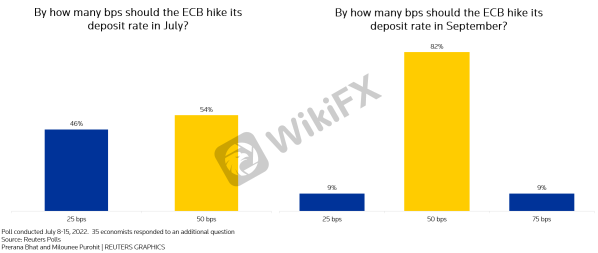
This week the euro fell to and below parity with the dollar, a reflection of how far behind a rapidly tightening Federal Reserve the ECB finds itself in having pre-committed to a small first step in a rate-hike campaign it has not yet started.
All but one of the 63 economists polled July 8-15 expected the ECB to stick to its pre-committed quarter-point rise on Thursday, taking the deposit rate to -0.25%. Only one expected a 50 basis point hike.
But a majority of respondents to an extra question, 19 out of 35, said the ECB should abandon its negative interest rates policy now with a 50 basis point hike. The rest said 25 basis points was the better move.
“The only factor pleading against a 50 basis point rate hike in July is the fact the Bank has pre-announced 25… It will take a lot of explaining to diverge,” said Peter Vanden Houte, chief economist, ING.

A majority of economists in the poll forecast a 50 basis point hike in September, followed by a quarter-point rise in October and December, taking the deposit rate to 0.75%. It is expected to reach 1.50% in the third quarter of next year.
But many said the window to raise rates is narrowing as gas shortages and soaring energy prices sap households purchasing power, dragging the bloc into a possible recession.
Poll medians showed a 45% chance of a recession within a year, much higher than the 34% in the previous poll.
“The ECB is far behind the curve and risks losing its credibility by not taking decisive action… It should rapidly abandon negative interest rates in July and then increase policy rates by another 50 basis points in September and October,” said Martin Weder, senior economist at ZKB.
“I think an unexpected 50 basis point hike in July would show it is taking inflation and price stability seriously and this would also support the euro,” said Weder, the one economist who forecasts the ECB will move by a half-point at the July 21 meeting.
The euro zone economy was expected to grow 2.7% this year and 1.5% next, from 2.6% and 1.8% predicted a month ago.
The median growth forecast for No. 1 economy Germany fell to 1.5% from 2.2% in the last quarterly poll in April. Expected growth in France dipped to 2.4% from 3.2%, while Italys forecast eased slightly to 2.7% from 2.8%.
“My personal guess is there is a 70-80% risk of a German recession, a tad lower for the euro zone as a whole,” said Erik Nielsen, global chief economist, UniCredit.
“I think the greatest risk of negative growth will be for Q4 2022 and Q1 2023, but it could well have started already.”
Euro zone inflation hit a record 8.6% in June, fuelled by energy prices stemming from Russias invasion of Ukraine, deepening a cost-of-living crisis.
Inflation is set to average 8.5% this quarter, over four times the ECBs 2.0% target and up from the 8.3% prediction given last month. It will ease gradually over coming quarters, but remain above target through next year.
Economists were positive about the ECBs efforts to draw up a new bond-buying mechanism that would allow them to limit the gap in yields between benchmark German bunds and other euro zone sovereign bonds.
All but one of 31 respondents said they were confident this would be ready by the ECBs September meeting, with 11 saying they were very confident.
Analysts said this would give the ECB leeway to raise interest rates more quickly as it would allow them to partially manage the bond markets reaction to its policy.

Leave a Reply